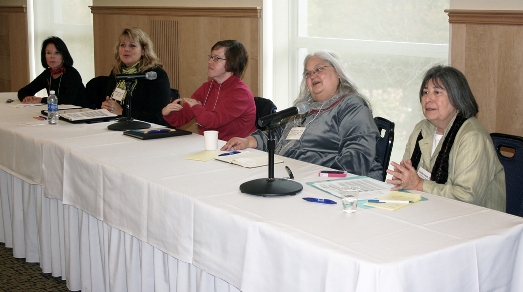PA and ME UCEDDs Partner on Grant to Promote Disability as Diversity in Postsecondary Education
October 30, 2011

|
| Disability as Diversity panel, left to right: Elizabeth DePoy, Julie B. Kessler, Ann Keefer, Tina Passman and Lu Zeph |
The Temple University Institute on Disabilities (UCEDD) and the University of Maine Center for Community Inclusion and Disability Studies (UCEDD) are partnering on the replication of Temple's 3-year demonstration project, Ensuring Higher Education Opportunity for All. The project, funded through the U.S. Department of Education, Office of Postsecondary Education, advances the message of "disability as diversity" in Temple's undergraduate core humanities curriculum and in diversity training
for new faculty and staff. "We want to convey the message that disability is a valued aspect of diversity at Temple University," says the project's co-principal investigator, Dr. Ann Keefer.
The Maine UCEDD has been awarded a mini-grant by the Institute on Disabilities to replicate and/or adapt Temple's promising practices at UMaine. Maine's replication efforts will include the following: curriculum transformation in the humanities and social sciences so that disability is treated as diversity in these courses; building the capacity of faculty to utilize principles of Universal Design for Learning in course delivery; and the pairing of an instructor with a disability with one or more of the participating humanities/social science faculty. "People with disabilities are not often recognized as knowledge producers," says Keefer.
During a recent site visit to Maine, Keefer and co-principal investigator Julie B. Kessler, Ph.D., served as panelists for a Disability as Diversity panel discussion with CCIDS director Lu Zeph, Ed.D., associate professor Tina Passman, Ph.D., and professor Elizabeth DePoy, Ph.D. Zeph, UMaine's Interim Associate Provost and Dean of the Division of Lifelong Learning, observed, "Students with disabilities who leave an academic environment drop out not because of academic reasons, but social reasons. They often don't find a welcoming environment in which they can thrive and succeed." As part of the replication grant, the Maine UCEDD will develop a plan to sustain the curriculum transformation, faculty capacity-building, and co-teaching to help eliminate the barriers to learning for all students and promote an inclusive and just campus community.







